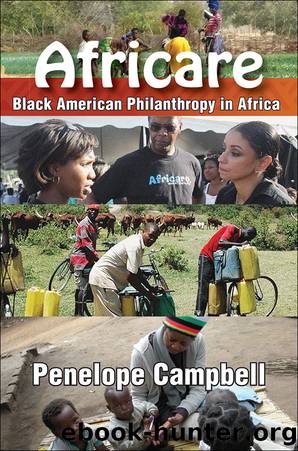Africare: Black American Philanthropy in Africa by Penelope Campbell

Author:Penelope Campbell [Campbell, Penelope]
Language: eng
Format: epub
Tags: Nonprofit Organizations & Charities, Africa, Social Science, Business & Economics, Philanthropy & Charity, History, General
ISBN: 9781412852548
Google: WTPwAQAAQBAJ
Goodreads: 17845901
Publisher: Routledge
Published: 2011-06-14T00:00:00+00:00
6
Monetizationâs Role in Food Security
By the late 1980s, after nearly two decades of service, Africare matured as an African American development organization. The geographical spread of its programs extended to every region of Africa. Funding sources stabilized to a pattern in which large undertakingsânational health drives, refugee relief, dam construction, and integrated rural developmentâwere underwritten by USAID, foundations, corporations, and similar benefactors. Churches, civic organizations, Africare chapters, clubs, and individual donors usually sponsored the more modest, but equally lifesaving efforts involving wells, vegetable gardens, dispensary repair, reforestation, and child nutrition. In 1987, however, Africare began considering an entirely different source of financing and another approach to its rural development projects in sub-Saharan Africa. After careful scrutiny of the U.S. Congressâ Food for Peace Program, it set up its own Food for Development unit at headquarters in Washington. It then witnessed the slow evolution of a complex program that moved it into intricate dealings and regulatory requirements with such American government entities as USAID, the United States Department of Agriculture, and the United States Congress; with foreign governments; with shipping companies in the United States and abroad; with sales agents in African countries; and with African consumers. The new era was marked by the use of food from the U.S. Government and its monetization in African commercial channels to finance program costs.
President Dwight D. Eisenhower signed the Agricultural Trade Development and Assistance Act that established the P.L. 480 Program (âFood for Peaceâ) in 1954. Among motives behind this Congressional initiative were recognition that American economic prosperity was interdependent with that of other nations and the awareness of American farmers that their incomes improved with overseas sales. The disposal of agricultural surpluses was a particular goal and, in theory, it would stimulate international trade. There was also willingness in the Congress to continue such aid efforts as those of the Marshall Plan because they demonstrated American leadership in international affairs. A third motive had to do with the complicated subject of world-wide foreign exchange flow. At the end of World War II, most nations had what were called nonconvertible currencies, meaning that their money was useless outside their own national borders, and they had very low quantities of hard currency, or foreign exchange, such as the US dollar and the British pound. One part of the P.L. 480 Program (Title I) initially allowed commodities to be paid for with the local currency of the recipient countries. In this way, the United States stockpiled funds in these nations that it could use for humanitarian purposes locally and recipient countries conserved their foreign exchange, which they could spend in hard currency nations such as the United States. Sometimes recipient governments received food shipments on long-term credit and were able to use their national treasuries for internal development needs.
In the first years of the P.L. 480 Program, the bulk of transactions, in fact 70% were sales of commodities for local currencies or on credit (Title I) and the United States Department of Agriculture administered it. Title II of P.
Download
This site does not store any files on its server. We only index and link to content provided by other sites. Please contact the content providers to delete copyright contents if any and email us, we'll remove relevant links or contents immediately.
Zero to IPO: Over $1 Trillion of Actionable Advice from the World's Most Successful Entrepreneurs by Frederic Kerrest(4525)
Machine Learning at Scale with H2O by Gregory Keys | David Whiting(4295)
Never by Ken Follett(3937)
Harry Potter and the Goblet Of Fire by J.K. Rowling(3848)
Ogilvy on Advertising by David Ogilvy(3605)
Shadow of Night by Deborah Harkness(3360)
The Man Who Died Twice by Richard Osman(3072)
Book of Life by Deborah Harkness(2931)
The Tipping Point by Malcolm Gladwell(2914)
Will by Will Smith(2911)
0041152001443424520 .pdf by Unknown(2843)
Purple Hibiscus by Chimamanda Ngozi Adichie(2827)
My Brilliant Friend by Elena Ferrante(2824)
How Proust Can Change Your Life by Alain De Botton(2807)
How to Pay Zero Taxes, 2018 by Jeff A. Schnepper(2646)
Hooked: A Dark, Contemporary Romance (Never After Series) by Emily McIntire(2550)
Rationality by Steven Pinker(2352)
Can't Hurt Me: Master Your Mind and Defy the Odds - Clean Edition by David Goggins(2324)
Borders by unknow(2304)
